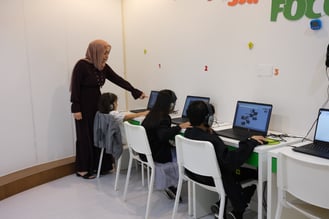Presidential debates are among the most highly anticipated events in politics, showcasing not only the policies and vision of candidates but also their intellectual sharpness, problem-solving abilities, and overall mental fitness. While charisma and rhetoric play a significant role in winning over an audience, a candidate's cognitive skills are what truly drive success in these high-pressure, high-stakes environments.
Here’s why strong cognitive abilities are essential to succeeding in a debate—and ultimately in winning the trust of the electorate.
 1. Quick Thinking and Mental Agility
1. Quick Thinking and Mental Agility
Debates are fast-paced and unpredictable. Candidates are expected to respond to complex questions, often without prior notice, and must counter their opponents’ arguments swiftly. This requires a high degree of mental agility—the ability to process information quickly, synthesize thoughts, and articulate coherent responses in real-time.
Cognitive skills such as working memory and executive functioning are crucial here. Candidates must hold information in their minds while formulating arguments, managing rebuttals, and considering the audience’s reaction—all within seconds. A lapse in memory or a slow response can be perceived as weakness, even if the candidate’s ideas are sound.
2. Emotional Regulation and Composure
Presidential debates are often emotionally charged, with candidates facing tough questions and heated exchanges. Maintaining composure under pressure is key to projecting confidence and leadership. Candidates with strong emotional regulation—a key component of cognitive control—are better equipped to handle the intensity of these situations without becoming defensive, flustered, or overly aggressive.
This emotional control allows candidates to respond thoughtfully and calmly, even when provoked, which is a critical factor in winning the respect of both the audience and their opponents.
3. Critical Thinking and Problem-Solving
In a debate, it’s not enough to simply have the right answer. Candidates must demonstrate that they can critically analyze the issues at hand, weigh multiple perspectives, and provide thoughtful solutions to complex problems. This requires robust cognitive flexibility, the ability to shift between different viewpoints, adapt to new information, and approach problems creatively.
Effective debaters need to break down arguments, identify weaknesses in their opponent's positions, and present alternative solutions that resonate with the audience. Cognitive skills such as logical reasoning and analytical thinking play an essential role in this process, helping candidates craft arguments that are both persuasive and grounded in fact.
4. Communication and Clarity
A successful debate performance isn’t just about having good ideas—it’s about being able to communicate those ideas clearly and convincingly. Candidates with strong cognitive skills are better at organizing their thoughts, ensuring that their messages are logical, concise, and easy for the audience to follow.
Verbal fluency—the ability to articulate thoughts smoothly and without hesitation—is another crucial cognitive skill in debates. Candidates who stumble over their words, speak in vague terms, or fail to make their point in a compelling way can lose the confidence of their audience, even if their policies are strong.
5. Adaptability in Real-Time Exchanges
Debates often feature unexpected challenges—whether it’s a curve-ball question from the moderator or an unanticipated attack from an opponent. Successful debaters need to be highly adaptive. They must think on their feet, adjust their strategy as the debate unfolds, and pivot when necessary.
Situational awareness—another key cognitive skill—helps candidates stay focused on the big picture, anticipate their opponents’ moves, and tailor their responses accordingly. Those who can’t adapt may come across as rigid or unprepared, which can be damaging in the eyes of voters.
6. Memory and Recall
During a debate, candidates are often required to cite facts, statistics, historical references, and policy details to support their arguments. A strong working memory and ability to quickly recall information is essential to this process. Forgetting key facts or failing to remember specific details can make a candidate seem uninformed or unreliable.
High-level cognitive skills help candidates retain large amounts of information and access it on demand, which is crucial for backing up claims and rebutting their opponents effectively.
7. Persuasion and Influence
Ultimately, the goal of a debate is to persuade the audience. While facts and logic are important, successful candidates also need to appeal to the emotions and values of voters. This involves social cognition—the ability to understand and predict how different arguments will resonate with various demographics.
Effective debaters use their cognitive skills to tailor their messages, appealing to the specific concerns and priorities of the audience, and leveraging emotional intelligence to connect on a deeper level.
Conclusion
Presidential debates are not just about showmanship—they are rigorous tests of a candidate’s cognitive abilities. The mental sharpness required to succeed goes far beyond delivering rehearsed lines or sticking to talking points. Successful debaters must demonstrate quick thinking, emotional control, critical analysis, clear communication, and the ability to adapt to new situations in real time.
In the end, it’s the candidates with the strongest cognitive skills who will rise above the noise, earning the trust and confidence of voters. After all, the ability to debate effectively is a clear indicator of a leader’s capacity to govern wisely and make sound decisions under pressure.
Investing in developing cognitive skills is not just valuable for politicians—it’s essential for anyone looking to excel in public discourse and beyond.

.jpg?width=399&height=600&name=Happy%20child%20(1).jpg) Dyslexia, a common learning disability, affects the way individuals process language, often making reading, writing, and spelling a challenge. While traditional educational approaches may provide some support, they often fall short in addressing the root cognitive issues associated with dyslexia. At Brainbox Kuwait, we believe in a different approach – one that focuses on enhancing the brain's cognitive abilities to overcome and, in many cases, eliminate the symptoms of dyslexia.
Dyslexia, a common learning disability, affects the way individuals process language, often making reading, writing, and spelling a challenge. While traditional educational approaches may provide some support, they often fall short in addressing the root cognitive issues associated with dyslexia. At Brainbox Kuwait, we believe in a different approach – one that focuses on enhancing the brain's cognitive abilities to overcome and, in many cases, eliminate the symptoms of dyslexia.
 The Benefits of Cognitive Training for Dyslexia
The Benefits of Cognitive Training for Dyslexia Cognitive training, which focuses on enhancing mental processes such as memory, attention, perception, and decision-making, plays an increasingly vital role in sports. In the context of the Olympic Games, where athletes from around the world compete at the highest level, cognitive training can be a game-changer. The integration of cognitive training into sports preparation not only improves athletic performance but also contributes significantly to the mental resilience required to excel on the world’s biggest stage.
Cognitive training, which focuses on enhancing mental processes such as memory, attention, perception, and decision-making, plays an increasingly vital role in sports. In the context of the Olympic Games, where athletes from around the world compete at the highest level, cognitive training can be a game-changer. The integration of cognitive training into sports preparation not only improves athletic performance but also contributes significantly to the mental resilience required to excel on the world’s biggest stage.
 Building Mental Resilience
Building Mental Resilience.jpg?width=299&height=450&name=Brain%20fog%20child%20(2).jpg) Brain fog is a term commonly used to describe a state of mental confusion, lack of focus, and diminished cognitive function. It’s not a medical condition itself, but rather a symptom associated with various underlying issues such as stress, sleep deprivation, poor diet, and certain medical conditions like chronic fatigue syndrome and fibromyalgia. Brain fog can significantly impact daily life, affecting an individual’s ability to perform tasks efficiently, make decisions, and maintain productivity. Understanding brain fog is crucial because it helps in identifying the factors that contribute to it and finding effective ways to combat it.
Brain fog is a term commonly used to describe a state of mental confusion, lack of focus, and diminished cognitive function. It’s not a medical condition itself, but rather a symptom associated with various underlying issues such as stress, sleep deprivation, poor diet, and certain medical conditions like chronic fatigue syndrome and fibromyalgia. Brain fog can significantly impact daily life, affecting an individual’s ability to perform tasks efficiently, make decisions, and maintain productivity. Understanding brain fog is crucial because it helps in identifying the factors that contribute to it and finding effective ways to combat it..jpg?width=299&height=450&name=brain%20fog%201%20(4).jpg)
.jpg?width=299&height=450&name=Happy%20child%20(3).jpg) Eliminating brain fog requires addressing its root causes, and cognitive training has emerged as an effective solution. Cognitive training involves structured exercises designed to improve various aspects of cognitive function, such as memory, attention, and problem-solving skills. By engaging in cognitive training, individuals can enhance their brain’s ability to process information, retain memories, and maintain focus. This targeted approach helps in reducing the symptoms of brain fog by strengthening the neural pathways involved in cognitive tasks, leading to improved mental clarity and overall brain health.
Eliminating brain fog requires addressing its root causes, and cognitive training has emerged as an effective solution. Cognitive training involves structured exercises designed to improve various aspects of cognitive function, such as memory, attention, and problem-solving skills. By engaging in cognitive training, individuals can enhance their brain’s ability to process information, retain memories, and maintain focus. This targeted approach helps in reducing the symptoms of brain fog by strengthening the neural pathways involved in cognitive tasks, leading to improved mental clarity and overall brain health.